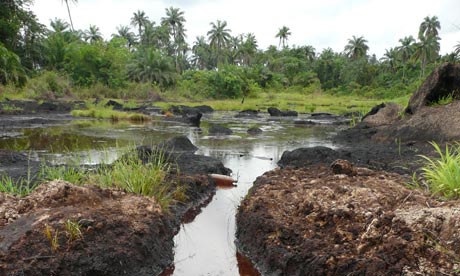Shell accepts liability for two oil spills in Nigeria
Oil giant faces a bill of hundreds of millions of dollars following class action suit brought on behalf of communities in Bodo, Ogoniland
- guardian.co.uk, Wednesday 3 August 2011 11.07 BST
- Article history
 The impact of an oil spill near Ikarama in the Niger delta. Photograph: Amnesty International UK
The impact of an oil spill near Ikarama in the Niger delta. Photograph: Amnesty International UKShell faces a bill of hundreds of millions of dollars after accepting full liability for two massive oil spills that have devastated a Nigerian community of 69,000 people and may take at least 20 years to clean up.
Oil spill experts who have studied video footage of the spills at Bodo in Ogoniland say the spills could together be as large as the 1989 Exxon Valdez disaster in Alaska when 10m gallons of oil was spilt. Until now, Shell has claimed that less than 40,000 gallons were spilt.
Papers seen by the Guardian show that following a class action suit in London over the past four months, the company has accepted responsibility for the double rupture in 2008 of the 50-year-old Bodo-Bonny trans-Niger pipeline that pumps 120,000 barrels of oil a day though the community.
Ogoniland is the small region of the Niger delta which threw out Shell in 1994 for its pollution but then saw eight of its leaders, including the writer Ken Saro-Wiwa, executed by the government.
The crude oil that gushed unchecked from the two Bodo spills which occurred within months of each other in 2008 has clearly devastated the 20 sq km network of creeks and inlets on which Bodo and as many as 30 other smaller settlements depend for food, water and fuel.
No attempt has been made to clean up the oil, which has collected on the creek sides, washes in and out on the tides and has seeped deep into the water table and farmland.
According to the communities in Bodo, in two years the company has only offered £3,500 together with 50 bags of rice, 50 bags of beans and a few cartons of sugar, tomatoes and groundnut oil. The offers were rejected as "insulting, provocative and beggarly" by the chiefs of Bodo, but later accepted on legal advice.
Shell's acceptance of full liability for the spills follows a class action suit bought on behalf of communities by London law firm Leigh Day and Co, which represented the Ivory Coast community that suffered health damage following the dumping of toxic waste by a ship leased to multinational oil company Trafigura in 2006.
Many other impoverished communities in the delta are now expected to seek damages for oil pollution against Shell in the British courts. On average, there are three oil spills a day by Shell and other companies working in the delta. Shell consistently blames the spills on local youths who, they argue, sabotage their network of pipelines.
"The news that Shell has accepted liability in Britain will be greeted with joy in the delta. The British courts may now be inundated with legitimate complaints," said Patrick Naagbartonm, coordinator for the Centre of Environment and Human Rights in Port Harcourt.
Later this week the company will be heavily implicated by the UN for the environmental disaster in the Niger delta which has seen more than 7,000 oil spills in the low lying swamps and farmland since 1989. Shell first discovered oil in the Niger delta in 1956. According to Amnesty International, more than 13m barrels of oil have been spilt in the delta, twice as much as by BP in last year's Gulf of Mexico spill.
The UN Environment Programme (UNEP) report, funded by Shell, will be presented to president Goodluck Jonathan on Thursday and is expected to be released on Friday in London.
UNEP's report, the first peer-reviewed scientific study of more than 60 spills, is expected to say that oil pollution in Ogoniland is much worse than previously believed, having sunk deep into the water table. Many spills have not been cleared up since 1970 and the effects on the local economy, health and development have been severe. The report will not apportion blame for individual spills.
International oil spill assessment experts who have seen the Bodo spill believe that it could cost the company more than $100m to clean up properly and restore the devastated mangrove forests that used to line the creeks and rivers but which have been killed by the oil.
Proceedings against Royal Dutch Shell and Shell petroleum development company (SPDC) Nigeria began in the high court on 6 April 2011. Last week Shell Nigeria said: "SPDC accepts responsibility under the Oil Pipelines Act for the two oil spills both of which were due to equipment failure. SPDC acknowledges that it is liable to pay compensation -to those who are entitled to receive such compensation."
2011-08-03
Shell accepts liability for two oil spills in Nigeria | Environment | The Guardian
via guardian.co.uk